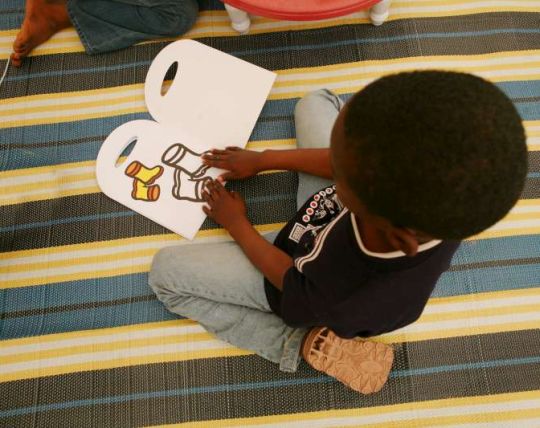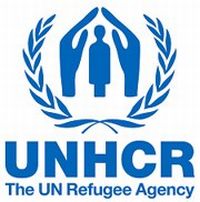UNHCR helps resettle 33 unaccompanied children from Tunisia to Norway
UNHCR helps resettle 33 unaccompanied children from Tunisia to Norway
 A young boy plays in a special tent run by UNHCR and Save the Children for children, including unaccompanied minors, at Choucha transit camp.
A young boy plays in a special tent run by UNHCR and Save the Children for children, including unaccompanied minors, at Choucha transit camp.
CHOUCHA CAMP, Tunisia, January 17 (UNHCR) – The UN refugee agency has helped resettle a group of 33 unaccompanied children who had spent months living in a special camp set up in Tunisia to provide shelter for people fleeing last year’s political turmoil in neighbouring Libya.
The children, who left for Norway on Sunday, were among 90 who arrived unaccompanied from Libya during 2011. Some were already without parents when they first arrived in Libya; others lost their parents or became separated from them subsequently. Most are from Somalia, Sudan, Ethiopia or Eritrea.
They had been staying in Tunisia’s Choucha camp, which is home to 3,400 refugees. The unaccompanied children have relied on help from friends and relatives, as well as local and international aid workers. In total, 39 of these 90 children have now been resettled – most to Norway, Sweden and Denmark.
“As they had formed strong bonds among each other, the departure has been painful for many of them –not least those still awaiting resettlement,” UNHCR spokesman Adrian Edwards told reporters in Geneva. “Life at Choucha camp remains difficult, with windswept conditions and bitter cold. UNHCR and its partners hope that solutions can quickly be found for the unaccompanied children who remain there –as well as for the other refugees who await solutions.”
UNHCR provides assistance at Choucha, works with the children and their communities to establish the best interests of each child, advocates for resettlement and submits cases to resettlement countries. The International Organization for Migration (IOM) provides child-friendly orientation and arranges transportation to new homes. It arranged the weekend flight to Norway.
Edwards stressed that UNHCR considers resettlement to be the only viable option for the majority of recognized refugees who fled Libya to Tunisia and Egypt last year. Both countries allowed hundreds of thousands of migrants to stay temporarily before being repatriated in a joint IOM-UNHCR operation. UNHCR and IOM have called upon states, especially European countries, to offer more resettlement places for the remaining refugees at the borders of Egypt and Tunisia.
UNHCR has completed refugee status determination for all 2,500 applicants in Choucha camp and 2,200 have been recognized as refugees. Together with an additional 800 people who were recognized as refugees in Libya before the unrest of 2011, more than 3,000 refugees have been submitted for resettlement from the camp.
Meanwhile at Egypt’s Saloum border crossing with Libya, around 1,400 people have been submitted for resettlement out of 1,830 there.
Resettlement referrals for both Choucha and Saloum have been submitted and accepted by Australia, Belgium, Canada, Denmark, Finland, Ireland, the Netherlands, Norway, Portugal, Sweden and the United States. Most recently, Germany, New Zealand and Spain have joined the resettlement effort by planning to send selection missions to the two camps.
UNHCR is calling on resettlement countries to expedite decisions on submissions. Currently only one out of five refugees submitted has been accepted, and only one out of six, or 731 refugees, has actually departed. UNHCR’s emergency transit centres in Romania and Slovakia are providing crucial additional space for refugees to be interviewed for onward resettlement from both Tunisia and Egypt, notably to the United States and the Netherlands.
By Adrian Edwards
###
About the Office of the United Nations High Commissioner for Refugees (UNHCR)

The Office of the United Nations High Commissioner for Refugees was established on December 14, 1950 by the United Nations General Assembly. The agency is mandated to lead and co-ordinate international action to protect refugees and resolve refugee problems worldwide. Its primary purpose is to safeguard the rights and well-being of refugees. It strives to ensure that everyone can exercise the right to seek asylum and find safe refuge in another State, with the option to return home voluntarily, integrate locally or to resettle in a third country. It also has a mandate to help stateless people.
In more than six decades, the agency has helped tens of millions of people restart their lives.
Today, a staff of some 7,685 people in more than 125 countries continues to help some 33.9 million persons.
###
> United Nations (UN).
 The United Nations was established on 24 October 1945 by 51 countries committed to preserving peace through international cooperation and collective security. Today, nearly every nation in the world belongs to the UN: membership totals 192 countries.
The United Nations was established on 24 October 1945 by 51 countries committed to preserving peace through international cooperation and collective security. Today, nearly every nation in the world belongs to the UN: membership totals 192 countries.
When States become Members of the United Nations, they agree to accept the obligations of the UN Charter, an international treaty that sets out basic principles of international relations. According to the Charter, the UN has four purposes:
- to maintain international peace and security;
- to develop friendly relations among nations;
- to cooperate in solving international problems and in promoting respect for human rights;
- and to be a centre for harmonizing the actions of nations.
###
* The above story is adapted from materials provided by United Nations (UN)
** More information at United Nations (UN)




















